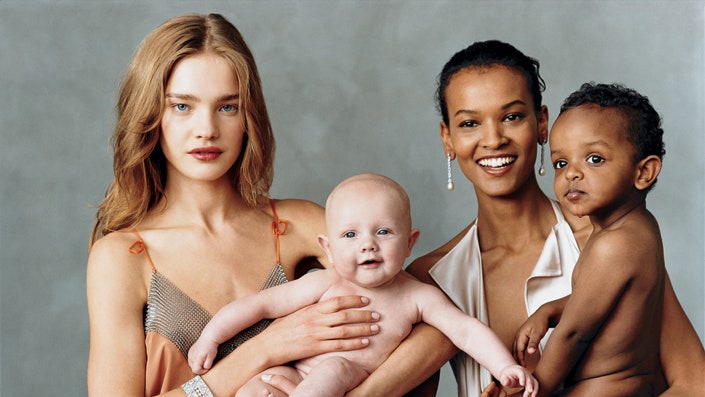Pregnancy can be a glorious time, but it can also be a confusing time, particularly when it comes to your skin. What skincare products to avoid while pregnant becomes top of mind and even seasoned beauty editors find themselves squinting at the complex lists of ingredients, trying to discern which formulas are fair game and which aren’t. And products that may seem harmless on first impression may actually be the opposite
But before you throw out your entire beauty cabinet and start fresh, there is some good news that will make this process a whole lot easier. Below, a doctor-approved cheat sheet on beauty ingredients, products, and services to avoid. Read on to see what’s safe for you and your baby.
How does your skin change during pregnancy?
Before jumping into the complete list of what skincare products are and aren’t safe, we have to understand how our skin can change while pregnant. According to Chris Tomassian, MD, founder of The Dermatology Collective and Kiehl’s Expert, you experience quite a large influx and change in your hormones that will ultimately cause many skin changes. Tomassian says that you may become more acne-prone as breakouts flare up with pregnancy. You may also be more prone to melasma and hyperpigmentation and experience more visible stretch marks and dilated leg veins known as varicose veins.
What skincare products are unsafe during pregnancy?
Macrene Alexiades-Armenakas, MD, New York City-based board-certified dermatologist explains that the U.S. Food & Drug Administration (FDA) has already done some of the work for us to help consumers determine which skincare products are unsafe during pregnancy. The governmental organization categorizes ingredients by letters of the alphabet, ranging from safest to those that should be avoided at all costs: A, B, C, D, and X. Generally, only categories A and B are considered safe to use during pregnancy, but it can be challenging to parse which ingredients on the list are found in beauty products, and it’s up to women to scrutinize labels closely. But the most common ingredients that all experts agree that you should generally avoid include the following:
Retin-A, Retinol, and Retinyl Palmitate
Though it also resides in FDA category C, which technically means risk to the fetus cannot be ruled out, Albert Sassoon, MD, an ob-gyn in Manhattan, says this family of products is to be avoided at all costs. While vitamin A is crucial to the proper development of the fetus, “getting too much can cause serious birth defects and liver toxicity,” he says. Also, though Retin-A is usually associated with prescription medication and skin care, plenty of over-the-counter formulations contain vitamin A derivatives like retinol and retinyl palmitate, both of which should be banned from your pregnancy beauty kit.
Tomassian adds that vitamin A derivative tretinoin should also be avoided. He explains that because its oral counterpart isotretinoin is know to be harmful to a baby’s development, it’s safer to also avoid putting it on topically altogether
Benzoyl Peroxide
Though pregnancy can often cause hormonal acne, unfortunately, the typical zit-zappers found over the counter, like benzoyl peroxide, fall in category C. “That means there’s some possible risk to the fetus, and a majority of ob-gyns I work with would say to avoid,” says Alexiades-Armenakas.
Essential Oils
Essential oils are not assessed by the FDA, yet they are increasingly used in beauty products marketed as safe. “In general, essential oils can be extremely harmful if not used appropriately,”Sassoon says. “Often they have 50 times the concentration used in a cup of tea and can be harmful even in a nonpregnancy state. The problem also is that we don’t know how much of a specific oil is absorbed.” Dendy Engelman, MD, FAAD, board-certified dermatologist and Mohs surgeon at Shafer Clinic Fifth Avenue suggests that diluted essential oils are generally considered safe, but because there are so many different types available, it’s best to go over the safety of any product or individual oil with your doctor. Two commonly used essential oils, though, ring warning bells: tea tree oil and rosemary oil. “Tea tree oil is very potent and toxic when ingested,” says Alexiades-Armenakas. “Its adverse effects include dermatitis, drug reactions, a blistering disease called linear IgA, and estrogenic effects.” Pregnant women should steer clear of it because “possibly these hormonal effects are to blame for premature contractions.” Meanwhile, rosemary oil can “raise blood pressure and cause uterine contractions at high doses,” Alexiades-Armenakas adds. “
Salicylic Acid
Also in category C, this ingredient is a particularly pesky one to sidestep as it is predominant in many acne treatments. “It’s traditionally been used for acne, but now I see it in all kinds of exfoliating products, particularly cleansers,” Alexiades-Armenakas says. “So much of what’s out there right now are combination peels,” adds Engelman. “When you’re pregnant, you have to seek out the purer products—the ones that feature just one of the acids that are approved.” She points out that glycolic, lactic, and mandelic acids are all considered safe and are good options for someone who still wants some sloughing action. Tomassian adds it’s really only a concern if the doses of the chemical exfoliants are particularly high; salicylic acid at 2 percent or lactic and glycolic acid at 10 percent should be fine, just consult with your doctor before using.
Hydroquinone
This powerful skin lightener may be tempting to use—particularly when pregnancy brings on dark spots or full-on melasma—but the ingredient is a no-no, says Alexiades-Armenakas, noting it falls into category C. Tomassian agrees and says that hydroquinone can absorb through the skin and that there is limited data proving that it can be safe during pregnancy, so he wouldn’t recommend it.
Tazorac, Accutane
Both are also vitamin A–derived formulations, but they’re prescription only and reside in category X: known to cause birth defects.
Aluminum Chloride Hexahydrate
If you’re pregnant, now is the time to switch to simple deodorants or natural alternatives. Found in antiperspirants, aluminum chloride hexahydrate affects the cells that produce sweat and is in FDA pregnancy category C, which means “to avoid,” says Dr. Alexiades-Armenakas.
Formaldehyde
Though the chemical is not currently classified under the FDA categories, many ob-gyns and dermatologists will advise pregnant women to limit their exposure. Stick with nail polishes labeled “3-Free” or “5-Free,” which exclude the chemical, says Engelman: “Gel manicures, in particular, tend to be higher in formaldehyde.” The same goes for Japanese and Brazilian hair-straightening procedures, which use formaldehyde during processing, Dr. Engelman adds. Salon workers are at particular risk. The National Institute for Occupational Safety and Health states working with formaldehyde may increase the chances of fertility problems or miscarriage.
Hair dye
“The frequent change in product formulation makes it very difficult to assess the potential risks,” Sassoon says. To err on the safe side, he recommends pregnant patients steer clear of hair coloring for the first 12 weeks, when the fetus is busy forming integral body parts and organs. Afterward, he says, occasional appointments are okay: “Such small amounts of chemical is absorbed through the scalp that the potential risk is very small if the appointments are infrequent.”
Chemical Sunscreens
Again, ingredients in chemical sunscreens are not all classified under the FDA categories, bu Engelman recommends sticking to mineral ingredients like zinc oxide and titanium dioxide. “There has been some suggestive evidence of chemical sunscreen risks, but they haven’t been fully substantiated yet,” Engelman says. “But since there are excellent physical blockers out there that are safe, why not take the risk out of it altogether?”
Elyse Love, MD, FAAD board-certified dermatologist and board advisor at Matter of Fact says that other topicals have limited data and should be discussed with a dermatologist to determine if it’s safe for you and your baby. “If the benefits of using the topical outweighs potential risk then it may be recommended,” she says. “Otherwise, it is best to keep skincare routines simple during pregnancy.”
What treatments should you avoid?
According to Love, most aesthetic procedures such as Botox and laser treatments should be avoided during pregnancy. Tomassian agrees and explains that Botox and other neuromodulators contain toxins that paralyzes muscle movement; if that toxin enters the bloodstream it could cause negative effects on the baby. With lasers, he says that it put you at a higher risk for skin conditions like hyperpigmentation (and since your skin is more sensitive, those lasers will feel more painful). He also recommends avoiding any strong chemical peels, fillers, and radiofrequency based devices.



